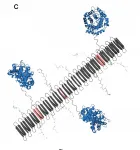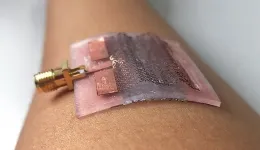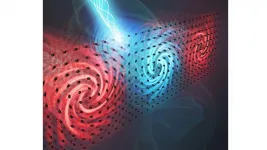The study, which has been published in Neuro-Oncology Advances today, analysed pieces of living human brain tissue from 20 people undergoing brain tumour surgery at King's College Hospital, the largest neuro-oncology centre in Europe. The researchers found groups of tumour cells clustered around blood vessels and believe that these sites could be the seedbeds for malignant progression, the process by which a tumour becomes a fast growing and uncontrolled cancer.
To study the brain tissue, neurosurgeons cooled the surface of the brain. They then took a sample and placed it into a cerebrospinal fluid solution. Once it had been transported to the lab, the tissue was then placed into a miniaturised incubation chamber specially designed for this study, where it was bathed in a solution that makes the living tumour cells fluoresce and more easily studied under a microscope.
Dr Gerald Finnerty, Lead author at King's IoPPN and Honorary Consultant Neurologist at King's College Hospital said, "This research is hugely significant. The "hotspots" we found exhibited many of the hallmarks of cancer. The ability to pinpoint areas at high risk of malignancy gives us a much better chance of establishing why the brain tumour becomes malignant."
Brain cancers are difficult to treat because they are so invasive. Even after surgery and chemoradiotherapy there is still a high risk that some cancerous cells can be left behind, increasing the likelihood that the cancer will return. This unfortunately means that many of the young adults it affects do not survive beyond a year.
Dr Alastair Kirby, First author on the study said, "It has been a privilege to work with brain tumour patients and our neurosurgical team to deliver this highly innovative research. Live human brain tissue offers great opportunities to study how a person's brain tumour responds to treatments. This will revolutionise therapy and bring precision medicine of brain cancer one step closer."
INFORMATION:
This research was made possible thanks to funding provided by the Medical Research Council (UK), Psychiatry Research Trust, and the Inman Charity.
Notes to Editors
"Multicellular 'hotspots' harbour high-grade potential in lower-grade gliomas"
(https://doi.org/10.1093/noajnl/vdab026) (Alastair J. Kirby, José P. Lavrador, Istvan Bodi, Francesco Vergani, Ranjeev Bhangoo, Keyoumars Ashkan, Gerald T. Finnerty) was published in Neuro-Oncology Advances.)
For further information and interviews with the authors, please contact Patrick O'Brien, Senior Media Officer, on 07813 706 151.
About King's College London and the Institute of Psychiatry, Psychology & Neuroscience
King's College London is one of the top 10 UK universities in the world (QS World University Rankings, 2018/19) and among the oldest in England. King's has more than 31,000 students (including more than 12,800 postgraduates) from some 150 countries worldwide, and some 8,500 staff.
The Institute of Psychiatry, Psychology & Neuroscience (IoPPN) at King's College London is the premier centre for mental health and related neurosciences research in Europe. It produces more highly cited outputs (top 1% citations) on mental health than any other centre (SciVal 2019) and on this metric we have risen from 16th (2014) to 4th (2019) in the world for highly cited neuroscience outputs. World-leading research from the IoPPN has made, and continues to make, an impact on how we understand, prevent and treat mental illness and other conditions that affect the brain. https://www.kcl.ac.uk/ioppn @KingsIoPPN
King's College Hospital NHS Foundation Trust is one of the UK's largest and busiest teaching hospitals, training over 900 dentists, 750 doctors and 300 nurses every year. The Trust is recognized internationally for its work in liver disease and transplantation, neurosciences, cardiac, haemato-oncology, stroke and major trauma. On 1 October 2013, King's took over the running of the Princess Royal University Hospital in Bromley and Orpington Hospital, as well as some services at Beckenham Beacon and Queen Mary's Hospital, Sidcup. The new enlarged organisation has over 10,500 staff and provides over 1 million patient contacts a year. 9,000 babies are delivered by our hospitals each year, and over 750 patients come to our Emergency Departments every day.
For more information, please visit the website. You can also support the work of King's College Hospital at supportkings.org.uk
King's Health Partners Academic Health Sciences Centre (AHSC) is a pioneering collaboration between King's College London and Guy's and St Thomas', King's College Hospital and South London and Maudsley NHS Foundation Trusts. We work collectively to make sure that the lessons from research are used more swiftly, effectively and systematically to provide better and more joined up physical and mental health care for people.
Our partnership brings together:
* three of the UK's leading NHS Foundation Trusts
* a world-leading university for health research and education
* nearly 4.3 million patient contacts
* more than 43,000 NHS and university staff
* 31,000 students
* a combined annual turnover of more than £3.7 billion
http://www.kingshealthpartners.org @kingshealth
At King's College Hospital we fundraise for the best in treatment, research and health education, leading-edge equipment and improving well-being in our communities. By uniting doctors, nurses, researchers and academics with our supporters and volunteers we can provide the best patient care that goes above and beyond. Find out more and support us at supportkings.org.uk
The Medical Research Council is at the forefront of scientific discovery to improve human health. Founded in 1913 to tackle tuberculosis, the MRC now invests taxpayers' money in some of the best medical research in the world across every area of health. Thirty-three MRC-funded researchers have won Nobel prizes in a wide range of disciplines, and MRC scientists have been behind such diverse discoveries as vitamins, the structure of DNA and the link between smoking and cancer, as well as achievements such as pioneering the use of randomised controlled trials, the invention of MRI scanning, and the development of a group of antibodies used in the making of some of the most successful drugs ever developed. Today, MRC-funded scientists tackle some of the greatest health problems facing humanity in the 21st century, from the rising tide of chronic diseases associated with ageing to the threats posed by rapidly mutating micro-organisms. The Medical Research Council is part of UK Research and Innovation. https://mrc.ukri.org/
The Psychiatry Research Trust's sole aim is to raise funds for mental health and brain disorders research into these devastating conditions at the Institute of Psychiatry, Psychology & Neuroscience (KCL) and its associated Mental Health Trust (South London & Maudsley Foundation Trust). Our target is not just to find better treatments for sufferers but also to understand the underlying causes of mental illness and brain disorders with the goal of finding means of preventions and cures for these illnesses.
We support young scientists in a wide range of mental health topics ranging across the life span, including Autism and Hyperactivity in childhood, Eating Disorders, Alcohol and Drug Addiction, Motor Neurone Disease, Depression, Schizophrenia and Alzheimer's and Parkinson's Disease in the elderly.
Many more conditions affect individuals of all ages. Mental illness and brain disorders are more common than many assume - they are part of everyone's life is some way.
The Inman Charity (registered charity number 261366) supports a wide range of UK registered charities. The directors are particularly interested in supporting the following areas of charitable work: Medical research, Care of the elderly, General welfare, Hospices, The Deaf and Blind, Care of the physically & mentally disabled and The Armed Forces





